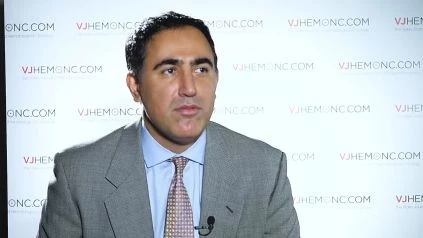In the last 15 years, there has been a revolution in our understanding of the pathogenesis of acute myeloid lymphoma (AML), as new genetic mutations have been discovered. Amir Fathi, MD, MPH, of Dana-Farber Cancer Institute, Boston, MA, stresses the significance of such mutations as targets for treatment, with some mutations even having prognostic implications. Dr Fathi gives the example of FLT3 mutations, which lead to worse prognosis in patients with AML because of their propensity for relapse. In the 2018 Society of Hematologic Oncology (SOHO) Annual Meeting, held in Houston, TX, Dr Fathi discusses the potential applications of other FLT3 inhibitors that could be approved and incorporated into more frontline settings.
[the_ad id="32629"]

